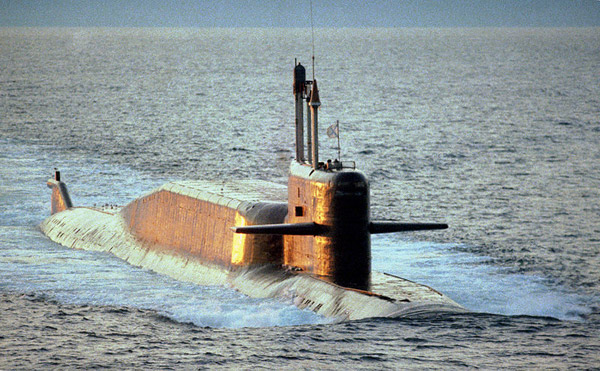Delta IV-class
Summary
| Origin country | 🇨🇳 Ex-USSR |
| Category | Submarine |
| Subtype | Nuclear ballistic missile submarine |
| Manufacturer | SEVMASH à Severodvinsk shipyards |
| Year commissioned | 1992 |
| Units |
Podmoskovye K-114 Tula K-117 Bryansk K-18 Karelia K-407 Novomoskovsk K-51 Verkhoturye |
| Current operators | 🇷🇺 Russia |
Description
The Delta IV-class submarine is a Russian nuclear-powered ballistic missile submarine. Originating from the Soviet Union, they form a significant part of the strategic submarine fleet and have been active since their introduction in 1973. Designed as an improvement over the Yankee-class submarines, the Delta-class submarines carry the R-29 Vysota family nuclear ballistic missiles, with each subclass, Delta I through Delta IV, carrying different versions of the missile system. These submarines provided the Soviet and later the Russian Navy with increased standoff capability, allowing them to patrol in the relative safety of the Arctic Ocean.
The Delta I (Project 667B Murena) subclass consisted of 18 boats, which were commissioned starting from December 1972. These boats were equipped with Tobol-B and Cyclone-B navigation systems, improving missile accuracy. By the late 1990s, all Delta I-class submarines were decommissioned.
The Delta II (Project 667BD Murena-M) subclass was an extended version of the Delta I to accommodate additional missile silos. Only four were built, with the last being decommissioned by 1996 in favor of the more advanced Delta III subclass.
Delta III (Project 667BDR Kalmar) included 14 submarines and featured a design with double hulls and ballistic missiles capable of carrying multiple independently targetable reentry vehicles (MIRVs). As of 2023, two Delta-III submarines remain in service, one of them having undergone significant modifications.
The Delta IV (Project 667BDRM Delfin) subclass saw seven built units, featuring improved iterations of the earlier Delta-designs. These submarines are armed with the D-9RM launch system and 16 R-29RMU Sineva liquid-fueled missiles with MIRVs. The Delta IV-class also boasts a suite of advanced navigational and hydroacoustic systems and employs an array of torpedo and missile-torpedo weaponry. Notably, they successfully executed Operation Behemoth, launching their entire payload of ballistic missiles, a unique achievement for SSBNs.
The Delta IV-class submarines continue to be of strategic importance for the Russian Navy. Initially, all Delta IVs were stationed at Olenya Bay with the Northern Fleet but subsequently moved to Yagelnaya Bay. Approximately five to six boats remain active as of 2023. Some Delta class submarines have been converted for special purposes by the Main Directorate Deep Sea Research (GUGI). Additionally, successful test fires of new missile versions have been conducted, such as the R-29RMU2 Layner, demonstrating continued upgrades to their armament.
Technical specifications
| Displacement | 11700 tons |
| Displacement submerged | 18200 tons |
| Endurance | 80 to 90 days autonomy |
| Width | 11.71 m (38.4 ft) |
| Length | 167.0 m (547.9 ft) |
| Max. depth | 400 m (1312.3 ft) |
| Propulsion | 2 VM-4SG reactors with a power of 60,000 hp - 2 propellers |
| Armament | 16 SS-N-23 Sineva (4 MIRV of 100 kT) + 4 533mm TLT (16 torpedoes or RPK-6 missiles or 24 mines) |
| Maximum speed | 14 knots |
| Max. speed submerged | 24 knots |

